| |||||
| Decades: | |||||
|---|---|---|---|---|---|
| See also: | Other events of 1757 List of years in Austria | ||||

Events from the year 1757 in Austria
| |||||
| Decades: | |||||
|---|---|---|---|---|---|
| See also: | Other events of 1757 List of years in Austria | ||||

Events from the year 1757 in Austria
| | This section needs expansion. You can help by adding to it. (October 2015) |

1757 (MDCCLVII) was a common year starting on Saturday of the Gregorian calendar and a common year starting on Wednesday of the Julian calendar, the 1757th year of the Common Era (CE) and Anno Domini (AD) designations, the 757th year of the 2nd millennium, the 57th year of the 18th century, and the 8th year of the 1750s decade. As of the start of 1757, the Gregorian calendar was 11 days ahead of the Julian calendar, which remained in localized use until 1923.

The Battle of Rossbach took place on 5 November 1757 during the Third Silesian War near the village of Rossbach (Roßbach), in the Electorate of Saxony. It is sometimes called the Battle of, or at, Reichardtswerben, after a different nearby town. In this 90-minute battle, Frederick the Great, king of Prussia, defeated an Allied army composed of French forces augmented by a contingent of the Reichsarmee of the Holy Roman Empire. The French and Imperial army included 41,110 men, opposing a considerably smaller Prussian force of 22,000. Despite overwhelming odds, Frederick managed to defeat the Imperials and the French.

The Silesian Wars were three wars fought in the mid-18th century between Prussia and Habsburg Austria for control of the Central European region of Silesia. The First (1740–1742) and Second (1744–1745) Silesian Wars formed parts of the wider War of the Austrian Succession, in which Prussia was a member of a coalition seeking territorial gain at Austria's expense. The Third Silesian War (1756–1763) was a theatre of the global Seven Years' War, in which Austria in turn led a coalition of powers aiming to seize Prussian territory.
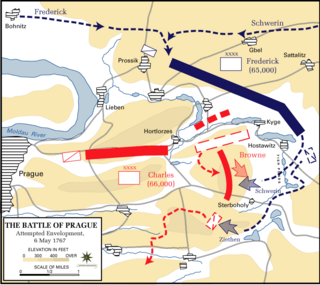
In the Battle of Prague or Battle of Štěrboholy, fought on 6 May 1757 during the Third Silesian War, Frederick the Great's 64,000 Prussians forced 60,000 Austrians to retreat, but having lost 14,300 men, decided he was not strong enough to attack Prague. The battle is mentioned in the famous German ballad Lenore written in 1773 by Gottfried August Bürger.
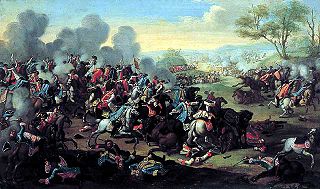
The Battle of Kolín (Kolin) on 18 June 1757 saw 54,000 Austrians under Count von Daun defeat 34,000 Prussians under Frederick the Great during the Third Silesian War. Prussian attempts to turn the Austrian right flank turned into piecemeal frontal attacks and were defeated in five and a half hours of combat. The Prussians lost 13,733 men, the Austrians 8,100. Frederick gave up the siege of Prague as well as his planned march on Vienna and retreated to Saxony.

The Battle of Moys was fought on 7 September 1757 during the Third Silesian War. A Prussian army of 13,000 men fought an Austrian army of double their size. The Prussians were defeated and their commander killed.

The Battle of Breslau was fought on 22 November 1757 in Breslau during the Third Silesian War. A Prussian army of 28,000 men fought an Austrian army of 60,000 men. The Prussians held off the Austrian attack, losing 6,000 men to the Austrians' 5,000 men. But one day later the Prussians beat a retreat. Breslau's garrison surrendered on 25 November 1757.

The Battle of Leuthen was fought on 5 December 1757 between Frederick the Great's Prussian Army and an Austrian army commanded by Prince Charles of Lorraine and Count Leopold Joseph von Daun. Frederick used maneuver warfare and knowledge of the terrain to rout the larger Austrian force completely. The victory ensured Prussian control of Silesia during the Third Silesian War, which was part of the Seven Years' War.

The Battle of Zorndorf, during the Seven Years' War, was fought on 25 August 1758 between Russian troops commanded by Count William Fermor and a Prussian army commanded by King Frederick the Great. The battle was tactically inconclusive, with both armies holding their ground and claiming victory. The site of the battle was the Prussian village of Zorndorf. During the battle, Frederick famously took a regimental standard and led an attack himself, rallying his troops.

Count Leopold Joseph von Daun, later Prince of Thiano, was an Austrian field marshal of the Imperial Army in the War of the Austrian Succession and Seven Years' War. Daun is considered one of the outstanding military leaders from his time.

Duke Ferdinand of Brunswick-Wolfenbüttel was a German military officer best known for his participation in the Seven Years' War. From 1757 to 1762, he led an Anglo-German army in western Germany which successfully repelled French attempts to capture Hanover.

The Seven Years' War (1756–1763) was a global conflict involving most of the European great powers, fought primarily in Europe and the Americas. One of the opposing alliances was led by Great Britain and Prussia. The other alliance was led by France and Austria, backed by Spain, Saxony, Sweden, and Russia. The French and Indian War (1754–1763), the Anglo-Spanish War (1762–1763), and the Spanish–Portuguese War (1762–1763) were all parts of the Seven Years' War.

The Third Silesian War was a war between Prussia and Austria that lasted from 1756 to 1763 and confirmed Prussia's control of the region of Silesia. The war was fought mainly in Silesia, Bohemia and Upper Saxony and formed one theatre of the Seven Years' War. It was the last of three Silesian Wars fought between Frederick the Great's Prussia and Maria Theresa's Austria in the mid-18th century, all three of which ended in Prussian control of Silesia.

The siege of Prague was an unsuccessful attempt by a Prussian army led by Frederick the Great to capture the Bohemian city of Prague during the Third Silesian War. It took place in May 1757 immediately after the Battle of Prague. Despite having won that battle, Frederick had lost 14,300 dead, and his severely depleted force was not strong enough to assault Prague. Instead Frederick decided to besiege the city, hoping to force it into submission through lack of supplies. 40,000 Austrian troops were trapped in the city, though they were themselves not strong enough to consider launching a sortie. Frederick attempted to gain intelligence from within Prague by sending the criminal Christian Andreas Käsebier several times into the besieged city.
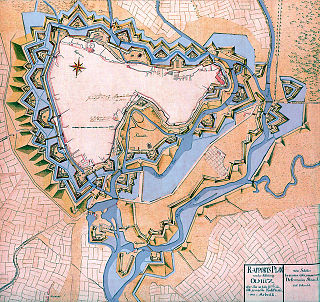
The siege of Olomouc took place in 1758 when a Prussian army led by Frederick the Great besieged the Austrian city of Olmütz during the Prussian invasion of Moravia in the Third Silesian War. The attempt stalled as the besiegers faced stronger resistance than Frederick had expected. With a lack of supplies and the approach of an Austrian relief force following the Battle of Domstadtl, Frederick abandoned the siege and withdrew from Moravia.
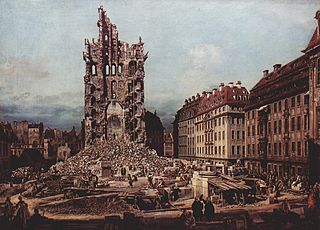
The siege of Dresden took place in July 1760 during the Third Silesian War when a Prussian force led by Frederick the Great unsuccessfully besieged the city of Dresden in Saxony.
Hans Caspar von Krockow was a Prussian major general and commander of the Cuirassier Regiment No. 1. He was the Amtshauptmann of the Giebichenstein and Moritzburg estates as well as heir to Estate A at Peest (Pieszcz), Paalow (Pałowo), Franken, Thien (Tyń) and Nitzlin (Nosalin). He fought in the Seven Years' War and died of injuries received at the Battle of Hochkirch.

The siege of Breslau was a siege in the Third Silesian War that began on 7 December 1757 and ended on 19 December 1757. After the defeat at Leuthen, the Austrians withdrew into Breslau. The combined Austro-French garrison of approximately 17,000 men, commanded by Lieutenant General Field Marshal Soloman Sprecher von Bernegg, faced a Prussian army commanded by Frederick the Great.
Kaspar Ernst von Schultze was a Lieutenant General of infantry in the Prussian Army, commander of the Breslau fortress, and director of the royal riding academy in Liegnitz. He was also the heir of the family estates at Mahlen in the Silesian county of Trebnitz. He fought in the wars of Spanish and Austrian succession, the Great Northern War, and the Seven Years' War. He served in the Prussian army under three monarchs: Frederick I, Frederick William I, and Frederick II. His name was included in 1851 on the Equestrian statue of Frederick the Great honoring the men considered to be the founders of the modern Prussian state.
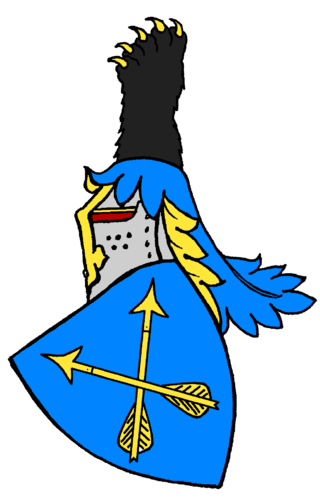
Soloman Sprecher von Bernegg was a Habsburg military commander in the War of Austrian Succession and the Seven Years' War.
![]() Media related to 1757 in Austria at Wikimedia Commons
Media related to 1757 in Austria at Wikimedia Commons